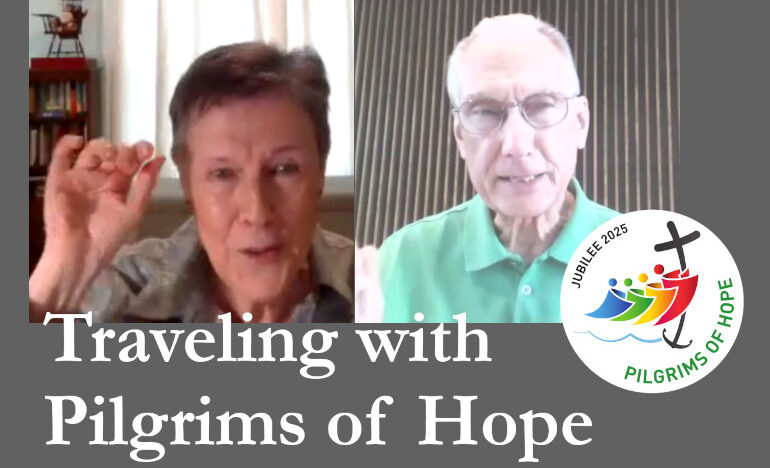Git ’er Done!

An Assembling God’s Puzzle video
By Fr. Garry Richmeier, C.PP.S.
We are a very goal-oriented society, so we tend to be very goal-oriented people. Sayings like “Keep your eyes on the prize,” and “If you don’t know where you’re going, you’ll probably never get there,” and “git ’er done” reinforce the value we place on having and achieving goals.
Goals help us to organize our efforts in a coherent way so that we aren’t just running around like a chicken with its head cut off, as my farming parents used to say. It is hard to imagine not having goals to guide us, whether they are immediate goals like planning what to cook for dinner, or long-term goals, like planning for retirement.
But one of the pieces to life’s puzzle that we have to figure out is how to balance focusing on our goals and living life in the present. Since we and our society place so much emphasis on goals and reaching those goals, they can easily become the only important thing to us.
We see this in the business world, where if an employee does not reach the goal of a certain number of products sold, or a certain number of items inspected, they are considered under performers, and they may be fired. Other considerations often are not taken into account. We see the priority of reaching a certain goal in the sports world. The goal is often to come in first in the competition, and if someone comes in second they are seen as a loser. As they say, nobody remembers who came in second.
Another danger in making the goal the main/only thing is that we can easily justify any means necessary to reach the goal. We can convince ourselves that the end justifies the means, which allows us to do terrible things to each other on the way to accomplishing the goal. This rationale has been used in every war ever fought, including the present war in the Mideast, where many are OK with tens of thousands being killed to reach the perceived goal of security or peace or control.
So how do we keep our goals from taking over and dictating how we work toward them? I like to use the image of climbing a mountain in this regard. So getting to the mountain’s peak is a goal that we may have our eyes on.
If that becomes the main/only goal for us, the process of getting there will be less important, and may even become an unpleasant task. In this case, every boulder and crevice we have to go around will be an irritating obstacle, blocking our way to reaching the goal.
And the more time we have to spend climbing (and not at the goal) the more we feel it is tedious, unsatisfactory, and not good. We may even feel that being anywhere on that mountain, except at the peak, is bad, and that we are a failure till we get to the peak.
However, if we consider the climbing itself as the goal also, then wherever we are on the mountain is OK for now. And as long as we are climbing, we are accomplishing that goal. Then each boulder and crevice can become interesting challenges to negotiate rather than obstacles preventing our advance.
The truth is, on the mountain of life we never reach the peak. We may accomplish some goals along the way, but there is always another step to take, another life challenge to take on. With the important things, there is no perfection to be reached, and no first place to be had. It’s probably only with age that we come to realize that the climb, the living, is the point.
The only goal that is achievable is to do our best to live with as much love, compassion, and forgiveness that we can, wherever we are on life’s mountain. We can be in that spot right now, and there is no other peak to get to. That brings deep satisfaction and peace of mind and heart.
Seeing life this way also eliminates the stress that competition often brings. We are able to see everyone else in the same boat, climbing life’s mountain, at whatever skill level they are, even if they are choosing a different route.
Age may help us get to this place of more peaceful living. But we can practice some things to help it along. We can practice bringing our attention to whatever we are doing at any given moment, rather than focusing on the future or the past. If I’m talking to someone or working on the computer, I can always ask myself “Is this important, and am I doing this with as much skill, care, love that I can?” If the answer is “yes,” then we will probably feel good about being there and doing that. And it is probably a good step in climbing life’s mountain.
Again, I can’t imagine not having goals in life. But living takes place in the present, not in the future. Choosing to live in the present in the best way possible is all we can do anyway. Not only is it the most satisfying and the least stressful, it is also the best thing we can to do help the future turn out well.
All of the videos in this series can be found here: Assembly God’s Puzzle.
Never miss an article published on the Renewal Center website: Sign up to receive our newsletters.
[Fr. Garry Richmeier, a Precious Blood priest and spiritual director, holds a Master’s of Divinity Degree from St John’s University in Collegeville, Minnesota, and a Master’s of Counseling Psychology degree from the University of Missouri-Kansas City. He is a licensed professional counselor and a licensed marriage and family therapist.]
Illustration 28972212 © Alain Lacroix | Dreamstime.com
We’d Like to Hear from You!
We’d like to know what you think about this article. Send us a comment using the form below. Do you have a suggestion? Is there something you want to learn more about? Send us a note.
Related

Pilgrims of Hope, Episode 6: Walking with Cancer Survivors
Hosted by Fr. Ron Will, C.PP.S.
We are talking with people who find hope amid difficult circumstances or bring hope to others. In this episode, Kathy Keary talks about how centering prayer, journaling and other spiritual practices helped her cope with two life threatening health issues.

The Rollercoaster Torture
An Assembling God’s Puzzle video
By Fr. Garry Richmeier, C.PP.S.
Life is full of ups and downs, like a roller coaster, and that fact is a piece of life’s puzzle that we must deal with. Depending on how we deal with it, it can be torture, or it can be simply another difficult aspect of life to be navigated. How do we avoid the torture?
Categories
Assembling God's Puzzle Coffee with Padre Cooking & Spirituality Encounters of the 4th Kind Family Matters Reflections on the Eucharsitic Prayers Spiritual Resources Taize Prayers The Contemplative Life Traveling with Pilgrims of Hope Uncategorized Videos Week of Prayer for Uhristian Unity When you need a little help
